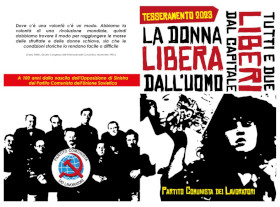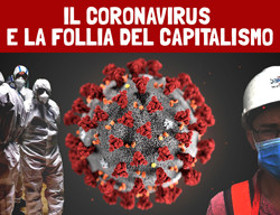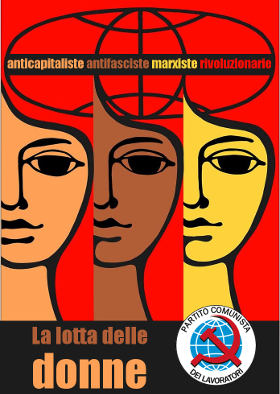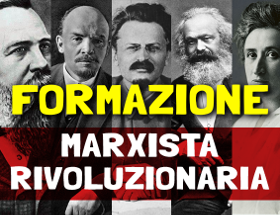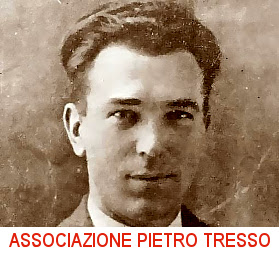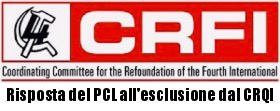Internazionale
Interview with a comrade from the Russian Revolutionary Workers’ Party (RWP)
1 Ottobre 2022
The Russian Revolutionary Workers’ Party (RWP, in Russian: Revolyutsionnaya Rabochaya Partiya) has consistently expressed its opposition to the war in Ukraine and to Russian imperialism. To guarantee our comrade’s safety, all names and all toponyms have been omitted. The comrade also insisted on using the expression “special military operation” instead of “war.” He explained us that even using the word “war” could be enough to have an administrative case opened against him. We wish him and all Russian comrades to successfully continue their struggle.
The interview dates back to before Russian President Vladimir Putin announced a “partial mobilization”. That should be taken into accoun when considering the comrades' answers.
Dear comrade, could you summarize your party’s stance on the war?
Yes, of course. My party’s stance has been explained in relative detail. After our last congress, which was held last May [2022], our stance was definitely confirmed. It is based on Vladimir Ilich Lenin’s work Imperialism, the Highest Stage of Capitalism. Referring to this work and to his theory of imperialism, we maintain that there is no good imperialism. I have never thought that there was such a thing. For example, let us look at the leader of the Communist Party of the Russian Federation (CPRF), Gennadii Andreevich Ziuganov, and at the famous leftist philosopher Žižek. Sometimes, their opinions coincide, and in this case, their stances on the bourgeoisie coincided. Slavoj Žižek and Gennadii Zyuganov think that there is a good capitalism which opposes bad capitalism. From Žižek’s point of view, Western capitalism is more progressive than Russian capitalism. Consequently, Zyuganov supports the opposite stance: that Russian capitalism is more progressive than the Western one. In reality, their stance is the same. I do not think that imperialist capitalism can be progressive. Our party’s stance refers exactly to this. It can be read on our website, and also in our social media group pages, precisely on Facebook, on the Russian social network VK, VKontakte, which is the one we mainly use, and also on Telegram. We presented it as a separate programmatic stance, as well as part of our congress resolution.
Will you tell us when and why you joined the Russian Revolutionary Workers’ Party?
So, in 2014 I already tended toward leftist views and ideas. Then, I underwent a change. I would say that at the time I was a bit more liberal than now. Possibly, because I am not educated enough, or because I live in a province, I do not understand many things. I am not a homophobe or transphobe, but I do not understand many things about gender issues. I do not understand many things about the so-called “neo-Marxist” parties, where I see much pretentiousness. At a certain point, one member of our party’s Central Committee wrote me on the internet. They also wrote to other people. When they saw that somebody seemed interested in Socialism, in Communism, they would write to them on the social network VK: “Hello, do Communist ideas interest you? Would you like to join our party?” The party tries to do propaganda a bit like Gandhi [laughs]: first they ignore you, then they deride you, then they fight you, and in the end, you defeat them! For a certain period, we were also derided for this, then others also began to use this technique, because it works. Yes, and I joined the Revolutionary Workers’ Party precisely in this way. At the time, much importance was given to identity issues, that is, what we call Western Marxism. Though, we also gave much importance, though, to Leninism and to Marxist analysis, when our founder was alive. Then, literally one year later, I went to the Congress, and to my surprise and even shock I was promoted to candidate status, and was elected to the Central Revisionary Commission. I did not expect that; it was a big surprise. I was elected one more time, but I asked to be exempted for personal problems. I would like to say one more thing about my party. Since I joined, there have been two schisms. One of them was rather significant. Like before, we continue our stance of critical support of the CPRF. We do not run after identity discourse. Though, in Russia lately the conservative discourse is itself somewhat standardized, as if it had become “normal.” Calls for violence against minorities are practically accepted, and this is not good. One thing is to discuss how many genders there are--50 or 60--and another thing is when for certain people it is really difficult to live on this planet, as simple as that. These are different things, and I support the stance that we must fight these people [violent homophobes] with any methods, with any means. Against the dangers to people’s life, so that they have a right to a safe life, to a job, etc.
How would you describe the Russian political system? Do you think Russia is an imperialist country?
Yes, I already said that when I answered the first question. Yes, Russia is a determined imperialist country. Even though it is a secondary imperialism if compared to America, for example, this does not at all justify Russian imperialism. On the contrary: I realized some elements of this imperialism at university, where I studied adolescent pedagogy. I see that our elites are childish, in a certain sense. They remind me of an adolescent who was humiliated, and at a given moment he tries to compensate this humiliation, to compensate it with violence. The more violence there is, the better! This also reminds me of the example of Israel. In Russia this is discussed openly. Why does Israel attack its neighbors? Why do the Turks do so? Why can’t we? That is, they try to be tough, as youngsters would say. Israel does not apologize for anything, never. If they shoot somebody, people do not care. They do not apologize, they drop bombs, they say they are shooting terrorists, and all is forgiven to them. There is a sort of desire to regain lost ground, so that in the capitalistic world they will treat you as a peer. And the method is to show your tough-guy ferocity, to be tough. This really reminds of the behavior of a troubled adolescent. On this level, certainly, Russian imperialism is disgusting. But apart from this, it is neither better nor worse than American imperialism, and Western imperialism more generally. Regarding the European Union, I do not think it is conducting an imperialistic policy. Chinese imperialism is another matter, since it is growing, as well as Turkish imperialism. Now, everyone is speaking about Russia, but there are more general dangerous tendencies in the world. Regarding the Russian political system, I would describe it as Bonapartist. What does that mean? The Russian elite is concentrated around the figure of the president. It consists of the oligarchy and of the institutions in charge of administrating force. These security apparatuses exert a determined function. That is, on the one hand, they brake the oligarchs with some populist slogans (the defense of the simple people, etc.), but they also try to appease the petty bourgeoisie and the working class, as well as financial and industrial capital, that is, those who are called “Putin’s friends” (though I would not say they are his friends, in reality). This maneuvering can be vaguely compared to the Napoleonic era, of the Second French Empire, that is, the era of Napoleon III. Of course, this is a vague comparison. The Russian political system also reminds me personally of Peronism in Argentina. Concerning Argentina, support to Juan Perón from below was so various that his supporters with different views practically waged war against each other. Remember that among the Peronists there were left-wing Peronists, known as the montoneros, and the Peronists of the AAA, the Argentinean Anti-Communist Alliance. Certainly, we do not have a similar phenomenon in Russia. But it seems to me that Putin’s Russia recalls Peronism, in a certain way.
How does the general population feel about the war? What does the working class think? Are there protests?
I will start with the issue of protests. There were protests, but they lasted for a very short period. Let us say that sanctions helped us very much (that is, not us, but our government). Sanctions helped us so much that now a few automobile factories practically closed down. Production was reduced or transferred to other factories. The automobile sector is in freefall. So, people cannot really protest. And even if they can, the majority is simply scared. There is an interesting episode I will tell you. There were protests in the spring, and they stopped very quickly. What is interesting is that actions supporting the “special operation” stopped! The National Bolshevik Party, the nats-bols as we call them (a sort of semi-Nazi guard) demonstrated in support of the “special operation,” and they rounded them up all the same, without making any distinctions! So, the concept is: do not go to demonstrate, and that’s it! And problems linked to the loss of jobs are felt more acutely. Now, there are no protests. There are probable protests on the internet, but on the internet you can find anything… Yes, there is the “conscience of the nation,” those who chose to emigrate. But the majority of the population does not consider them. To come back to the beginning of the question, excuse me for what will be a long answer… The feelings of the population are contradictory. Here, the point is that within Russia’s population, with the exception of a marginal segment, there are no people who justify the Kiev government. Some, probably the majority, consider Ukraine a brotherly country. But the Kiev government is practically considered an occupiers’ government, agents of the USA’s State Department, as if it were not a Ukrainian government. And from this opinion takes shape the notion that we must liberate them, topple these occupiers, and--boom!--Ukraine will become “normal”… With the exception of Western Ukraine. There is a metaphysical conviction that Ukrainians tend toward Russia, and that if they try to say so, the Nazis, that is the Nazi battalions, will smash their heads on the street. It is true, there are these Nazi battalions, and their presence serves to strengthen this myth. There are really Nazis, and they are very visible. I think that there are more than in Russia, at this moment. Ours all went into hiding. Or they “disguised” themselves with other forms: Cossacks, people who speak about the “Russian world,” patriots, etc. So, there is this desire to make Ukraine “free,” even though Ukraine really does not ask for this. There is this idea that we will go back in time, that we will again visit each other on holiday, that Zelenski will again make stupid Russian comedies, as he did in the 2000s… that peace and friendship will return between us, as before, as soon as we topple the Kiev government… Obviously, things will not go this way. Regarding the opinion of the working class, it is a bit similar to the general opinion. People do not like the methods. Many justify the ends, but do not like the methods with which the “special operation” is conducted. They do not think the Ukrainians are real enemies. Some do not like the methods or the ends, but still do not love the Kiev government. They worry about the Donbas population, whom the Ukrainian army is really shooting, and say: “Why do they do that?” But the Ukrainian army does that… For example, my mom honestly worries a lot about the Donbas children who are dying… Obviously, children are not only dying there. In this there is no nastiness or hatred. There is an honest desire to make this country “free,” in our ideological sense, to do “good” to them… Possibly, it is difficult to explain all this to foreigners…
Will you tell us where you worked at the beginning of the war, and why you decided to resign? What is your current job?
This is a separate story. At the time I worked in a mechanical factory that produces machine guns. Precisely, I worked directly on production. The week preceding the beginning of the “special operation” I did not go to work. I felt really badly, and, naturally, I suffered due to the evolution of the political situation. In the end, I bucked up and said: “Ok, tomorrow I will go to work.” I woke up in the morning, I took the trolleybus, I watched my phone, and I see that in our Party social media groups there is a mess… Everyone was shouting, everyone was saying: they’ve invaded, they invaded… Previously, there had been many false alarms: Russia intervened, it did not intervene, etc… So, we did not understand. When I arrived at work, I expected that they would fire me. Or at least that they would take away from me all possible production prizes… I expected that they would give me a harsh scolding, that my boss would destroy and eat me. But nobody gave a damn about me… Everybody seemed really concerned, very serious… We were in the smoking room, our boss arrived running and said: “Put the phones away, everybody get to work, you will read the news later!” So, nobody thought about me. I couldn’t access the internet on my phone, my data was spent. And you cannot just go out and upload more credit, because it is very difficult to exit the factory’s territory. Everybody was saying that the economy will be destroyed, that we will be under total embargo, etc. And that it made sense to buy food supplies, which I also did. Literally after two days, when I received my salary, we bought food for two months, thinking that prices would skyrocket. Then the psychoses on sugar began, etc. In general we were quite scared. What will happen now? Honestly, I did not think that with all the sanctions the economy would hold out so well. I would not say that the situation is perfect, but we honestly expected much worse. We certainly expected the ruble’s deflation. People went to buy dollars, then they began to swear… When I still had not resigned yet, one colleague of mine was complaining that he did not buy dollars before, then, after a few months he was running around crying: “Why didn’t I sell dollars?!” Because the ruble strengthened considerably. Why did I resign? I resigned for several reasons. I really had a moral breakdown. I also would like to add that I am a Russian gunsmith. I do not know if you know the sculpture the Motherland Calls in Volgograd [Stalingrad], which in reality is a sculpture ensemble composed of three parts. There is one monument in Magnitogorsk [industrial city on the Urals], which depicts a Rear Worker handing a sword over to a Red Army Soldier. In Stalingrad, the Motherland raises this sword, and in Berlin the Liberating Private, who holds a little German girl in his arms, lowers this sword. Enough, the war is over. That is, I raised it, I sent the enemy away, and enough, now I do not need it any more. That is, this Liberating Private does not use his sword like a sadist, he does not cut German children into slices with this sword. We do not make weapons for this! I wanted to say this… I do not know if my metaphors are understandable. Anyway, I also resigned for professional reasons. My qualifications were not good enough, and did not meet the production standards where I was working. I tried to work for another department, but I could not, so I had to resign. Finally, political reasons also certainly influenced my choice. Now, I work in the private sector, in the administration of apartment blocks.
How did your family and people around you react to your choice?
In general, my stance was perfectly understood. My mom watches a lot of television and all this propaganda, so she has a very patriotic, so to say, or rather pro-Putin stance. My father has a bit more reasonable stance and understands me. The others also understand me. As I was saying, this lived situation is a bit deeper and more complicated than what it may seem, especially from abroad. The population has a complicated perception. Then, one must not forget that the Donbas exists, that there are people living there, and that the Ukrainian army is shooting them all the time, already with NATO weapons. This is really happening. Now, I do not want to speak of hypocrisy, but now everybody speaks about the aggression against Ukraine, and obviously this is bad, it is terrible. Notwithstanding that, Ukrainians machine-gun the Lugansk region, as if it were a normal, ordinary thing.
Do russian people speak about the crimes of the Russian army against the civilian population? What do you personally think about this issue?
This is a very dangerous question, because it is very close to the code article which could be used to sentence me, but I will answer anyway [the comrade insists on answering]. I take all responsibility. In reality, not everybody believes it. Yes, we speak about it. In fact, this is exactly one of the reasons why people do not want to support Russia’s methods. One must also consider that there are big Russian losses; they are really very big. Many, even many officers, do not like the fighting methods. Many do not understand. If there are such precise, modern weapons, why don’t you understand what these weapons end up targeting? All are convinced that these strikes are not intentional. Of this, absolutely everybody is convinced. Everybody is convinced that these strikes are accidental. But the question spontaneously arises: why do they fight so “unprofessionally”? I studied a lot of local conflicts, and it never happened that everything went well. That is, Americans in Iraq bombed civilian targets, and we simply do not know how many in the civilian population died, because nobody cared at all about Iraqis. Iraqis were not supported by the capitalistic center. Forget about Vietnam, or how many losses there were in Afghanistan during the American intervention, and also the Soviet one… One does not know, because nobody took care to count. Here, by contrast, everybody’s interested. Be that as it may, in Russia we speak more about Ukrainian war crimes. To give another example, here in Russia we all remember well the Hague tribunal on Yugoslavia. We know how all sides of the conflict behaved, but only the Serbs turned out guilty. By contrast, the sentences that the tribunal meted out to Bosnian and Croat war criminals were ridiculous: from two to ten years of prison for massacres. So, in Russia people say: “If they have double standards, why should we be objective in this situation? We will also use double standards.” Now, I do not want to make a philosophical speech, but here it seems to me that in such a situation nobody is right. War crimes are war crimes. War is not a joke, it is not funny.
Many in the West criticize their own media, saying that they report on the war very unilaterally. What do you think about the Russian media’s coverage of the war?
They behave exactly in the same way. The expression you used already answers the question. They beat on their line exactly in the same way. They ignore, deny, speculate on the data. They continuously say that Western media is all alike, that they have double standards, that they are controlled by the will of their owners. Therefore, the two cases seem absolutely alike to me… I can also say that the methods of the Ukrainian media are not very different from Russian methods. This is all that can be said about this subject.
How do you think Ukraine should defend itself? Do you think it has the right to receive weapons from other countries?
Any independent country has the right to receive help from other independent, sovereign countries. It is an absolutely natural right. In this case, I would like to say that all this reminds me of the 17th century in America, specifically of colonial policy. The French armed the Algonquians with muskets, with a lot of muskets, while the British armed the Iroquois. I am referring to the 7-year Franco-Indian War. They happily killed each other, destroying the surrounding nature which gave them resources. They sterilize it, and were thus forced to move west, because their land was completely emptied out. The Algonquians also went further west. In sum, the only thing they obtained waging wars against each other is that they destroyed their own land, and were forced to abandon it. That land was happily inhabited by European settlers, who had a more advanced, less invasive economy. They practiced more intensive agriculture, etc. They did not care; for them such an emptied out environment sufficed. This is what happened at the time. Anyway, to come back to the direct answer: yes, any country has the right to help, or at least to ask for help.
What do think about the claims of the Russian state media, according to which all Ukrainians are “Nazis”?
It is simply nonsense, nonsense! I will answer you with Jim Jarmusch’s words: it is nonsense, f…ing nonsense! [slowly spells the words] But let me make a correction or clarification. The statements of the Russian media sound like this, they can be interpreted precisely like this, but the context is a bit different, as I’ve said. That is, from the point of view of the current ideology in Russia, not all Ukrainians are Nazis. First of all, Western Ukraine is considered Nazi. And this expression does not indicate some determined territory, with borders. It is a sort of metaphysical formula. A certain Western Ukraine is the enemy. It is the enemy, it is fundamentally not ours, it does not belong to us. And then there is another Ukraine, which is not an enemy, but which is subordinated, conquered. This is the good, righteous Ukraine. And consequently, according to the ruling ideology, Western Ukrainians have conquered Eastern Ukrainians, apart from the southeast of the country and the regions of Donetsk and Lugansk, which rose up. On this, one must also say that the Donbas movement was a movement from below. At the beginning, the anti-Maidan was a movement absolutely from below, which was then conquered and hijacked, first by local elites, and then by the Russian oligarchy. It was conquered and put under control, but originally it was a thing from below. And this did not happen only in the Donbas; it also happened in Ukraine’s central regions: Kherson, Zaporozh'e Chernigov, Odessa. We know that there, in Odessa, Ukrainian nationalists set the House of the Trade Unions on fire with people inside. Therefore, we are talking about complex movements. At the time, there was an honest desire to stop Ukrainian nationalism. Anyway, the people have gone completely mad with these ideological terms. The theory of putting everybody into one basket is now more and more marginal, and it is somewhat changing. For example, let us take Daria Dugina’s killing. Those who killed her practically created a martyr for this “Russian world” theory. They made a sort of Joan of Arc out of this woman with horribly reactionary and nationalist conceptions. For me, it is also hard to believe that the Ukrainian secret services took part in this, because it is the most precious gift that one could give to Russian nationalists and chauvinists. From a strategic-military point of view, it was a completely useless action. A martyr was simply created, strengthening this general union and this hatred, of which there is already enough, and in which we are already drowning. I want to add that I have friends in Ukraine, and that there also attempts to brainwash them on this issue, after the beginning of the “special military operation.” I ask you to write “special military operation,” not “w…” [we reassure him]. After the last successful military operations of the Ukrainian army, the people were plunged into a sort of hatred. Here I cannot say: “You silly people, you understand nothing,” because it is merely an emotional reaction.
What do you think about Western leftists who say that Putin must be supported? If you had a chance to debate with them, what would you tell them?
I will give this example. There is one Russian scholar who deals with Latin America, Oleg Iasinskii. He does not live in Russia. He has been living in Chile for a long time, I think, or anyway in South America. He absolutely and radically stands up for Russia, even though he knows what capitalism is. He is a leftist, a Socialist. But he also makes a qualification, which in this case is very important: “I have not been living in Russia for a long time. I do not know anymore what it is like, what happens there. I see what American imperialism is here, in South America. It is incredibly visible. In South America it is absolutely obvious. There is an incredibly clear, direct and wild interference by American imperialism, in its most terrible aspect.” And here, too, one can understand this person. That is, de facto he sees the situation from one side. Stop. He sees that American imperialism is evil. And he does not understand that Russian imperialism appears as if it were an alternative, even though it is not an alternative. This is the problem. This is what I can say on the matter. And regarding those who in the West support Russian imperialism, I think that they must be Stalinists, because I know that Stalinists like to support Putin. They have done that for a long time. It all depends on how they reach the conclusion that Russian imperialism is in a certain sense better [than other variants of imperialism]. Oleg Iasinskii has a very subjective take. And he immediately makes this qualification: “I do not know what it is like in Russia. I know what it is like here. Here we must strike and defeat America.” See? Then, if these pro-Putin Western leftists make some conjectures, or if they receive some money, it is on their conscience. Certainly, I will not support this stance. Absolutely not; no thanks. It would cost too much. There is something higher than personal interests. I think we must be principled people.


